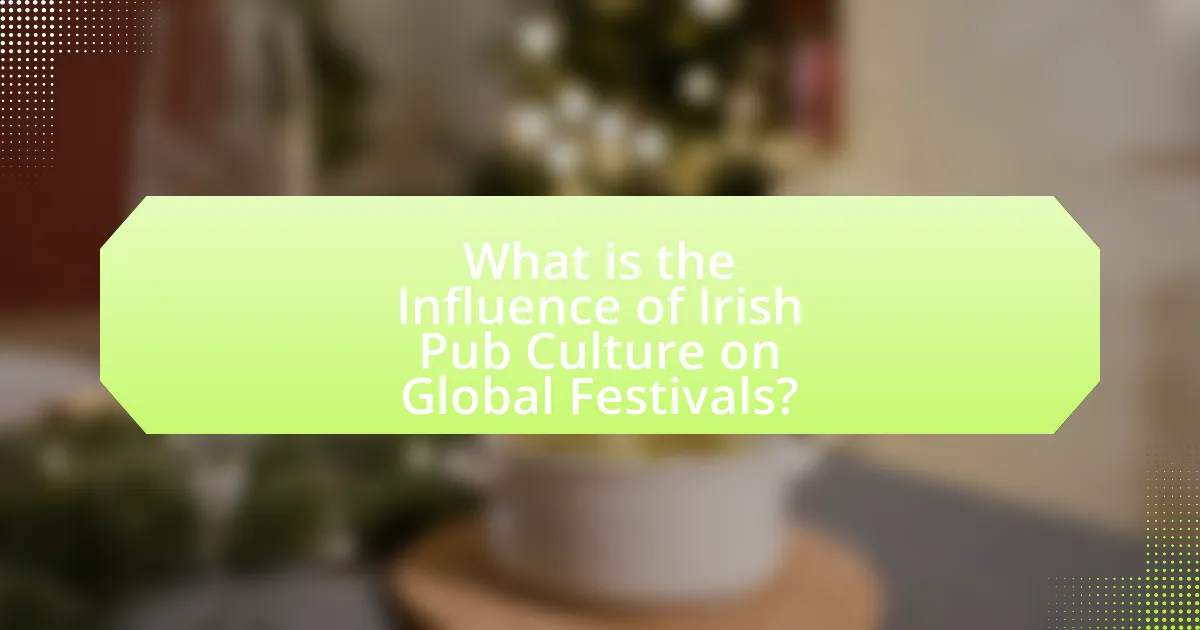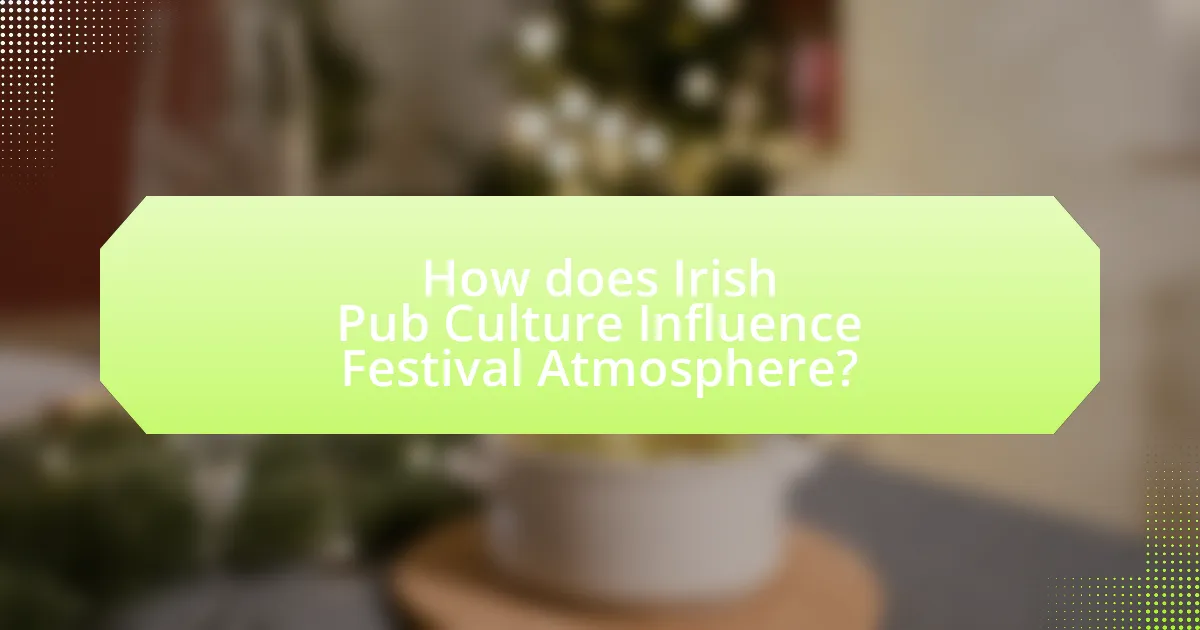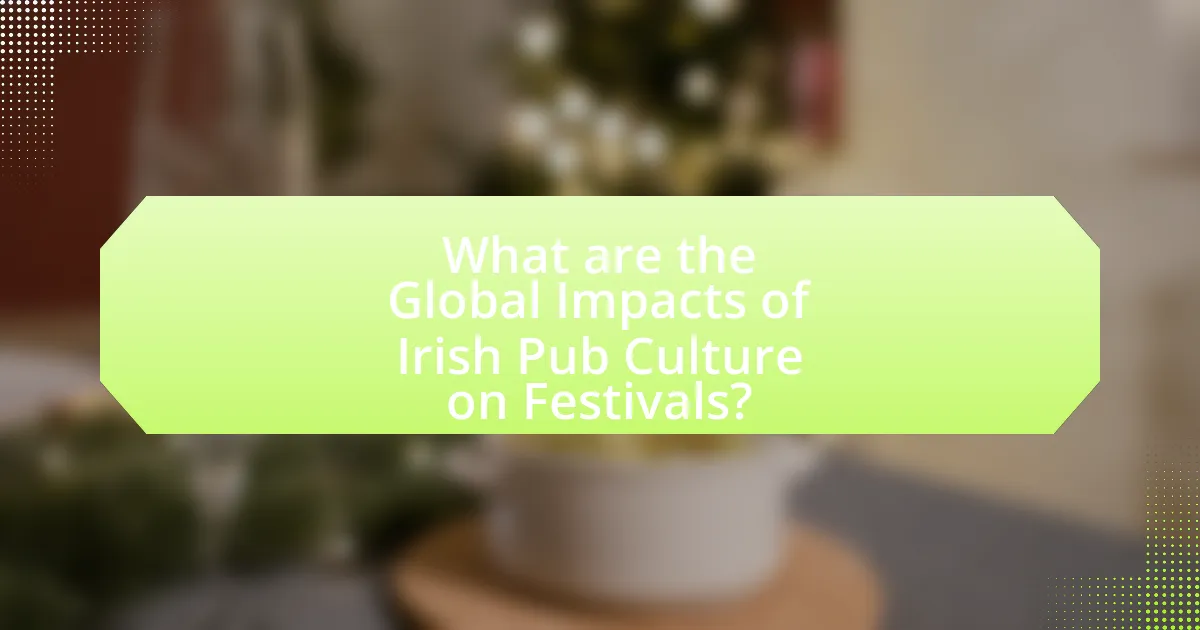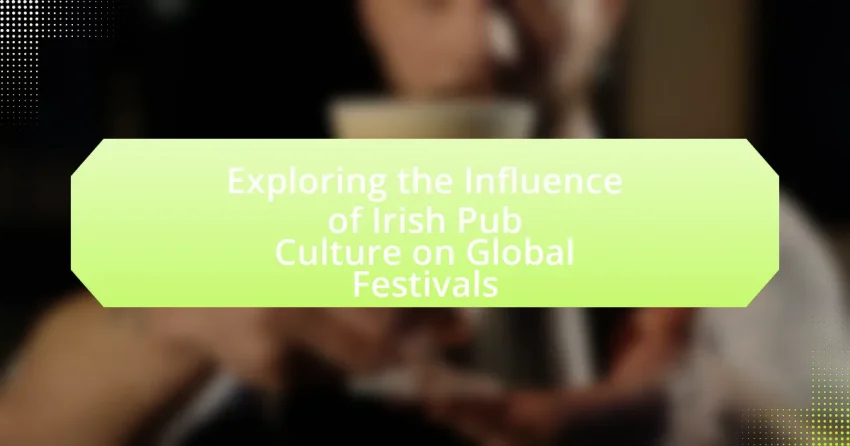The article examines the significant influence of Irish pub culture on global festivals, highlighting its role in promoting communal celebration, live music, and traditional hospitality. It traces the origins and evolution of Irish pub culture, shaped by historical events and immigration, and discusses its key characteristics, including the importance of music, food, and social interaction. The article also explores how festivals worldwide incorporate elements of Irish culture, enhancing community engagement and cultural exchange, while addressing challenges related to authenticity and cultural appropriation. Overall, it emphasizes the vital role of Irish pubs as cultural hubs during festivals, contributing to a vibrant and inclusive atmosphere.

What is the Influence of Irish Pub Culture on Global Festivals?
Irish pub culture significantly influences global festivals by promoting communal celebration, live music, and traditional Irish hospitality. This cultural impact is evident in various international events, such as St. Patrick’s Day celebrations, where pubs worldwide serve Irish food and beverages, fostering a sense of community and shared experience. Additionally, many festivals incorporate elements of Irish music and dance, reflecting the global popularity of traditional Irish entertainment. For instance, the rise of Irish-themed festivals in countries like the United States and Australia showcases how Irish pub culture has been embraced and adapted, creating vibrant atmospheres that attract diverse audiences.
How did Irish pub culture originate and evolve?
Irish pub culture originated in the 12th century with the establishment of taverns in Ireland, which served as social hubs for communities. These early establishments provided food, drink, and a space for social interaction, reflecting the communal nature of Irish society. Over time, the culture evolved significantly, particularly during the 18th and 19th centuries, when the rise of the Irish diaspora led to the proliferation of pubs in cities around the world, especially in the United States and Australia. This expansion facilitated the blending of Irish traditions with local customs, further enriching the pub experience. The significance of music, storytelling, and community gatherings in Irish pubs became integral to their identity, fostering a sense of belonging and cultural continuity among patrons.
What historical events shaped Irish pub culture?
The historical events that shaped Irish pub culture include the establishment of the Public House Act of 1902, which regulated the licensing of pubs, and the Great Famine of the 1840s, which led to significant social changes and the rise of communal drinking as a means of coping with hardship. The 20th century saw the emergence of the Irish diaspora, particularly during the mass emigration periods, which spread Irish pub culture globally. Additionally, the influence of the Catholic Church and the prohibition era in the United States also played a role in shaping the character and social functions of Irish pubs. These events collectively contributed to the evolution of pubs as central social hubs in Irish communities, both domestically and abroad.
How has immigration influenced the spread of Irish pub culture?
Immigration has significantly influenced the spread of Irish pub culture by facilitating the establishment of Irish pubs in various countries, particularly in the United States, Canada, and Australia. As Irish immigrants settled in these regions, they brought their cultural traditions, including the concept of the pub as a social gathering place. For instance, by the late 19th and early 20th centuries, Irish immigrants had opened thousands of pubs across America, which became central to community life and cultural exchange. This proliferation of Irish pubs contributed to the global recognition of Irish pub culture, characterized by its unique atmosphere, music, and community-oriented practices. The cultural exchange fostered by these establishments has led to the incorporation of Irish pub elements into local festivals and celebrations, further embedding Irish culture in the social fabric of diverse societies.
What are the key characteristics of Irish pub culture?
Irish pub culture is characterized by a warm, welcoming atmosphere, communal socializing, and a strong emphasis on music and storytelling. Pubs serve as social hubs where people gather to enjoy drinks, share conversations, and participate in traditional music sessions, often featuring live performances of folk music. The design of Irish pubs typically includes cozy interiors, wooden furnishings, and a bar that encourages interaction among patrons. Additionally, many pubs host events such as quiz nights and cultural celebrations, reinforcing their role in community engagement. This culture has influenced global festivals by promoting the idea of communal celebration and the enjoyment of local music and traditions.
What role does music play in Irish pubs?
Music serves as a central element in Irish pubs, fostering a vibrant atmosphere that encourages social interaction and cultural expression. Traditional Irish music, often performed live, enhances the communal experience, creating a sense of belonging among patrons. This musical tradition includes instruments like the fiddle, bodhrán, and tin whistle, which are integral to the pub experience. Research indicates that live music in pubs can increase customer satisfaction and retention, as it provides entertainment and a unique cultural experience that distinguishes Irish pubs from other venues. The role of music in Irish pubs not only entertains but also preserves and promotes Irish heritage, making it a vital component of the overall pub culture.
How do food and drink contribute to the pub experience?
Food and drink are central to the pub experience, as they enhance social interactions and create a welcoming atmosphere. The availability of traditional dishes and beverages, such as Irish stew and Guinness, fosters a sense of cultural identity and community among patrons. Studies indicate that shared meals and drinks can strengthen social bonds, making pubs a preferred venue for gatherings and celebrations. Furthermore, the sensory elements of food and drink, including taste and aroma, contribute to the overall ambiance, encouraging longer stays and repeat visits.
Why is Irish pub culture significant in the context of global festivals?
Irish pub culture is significant in the context of global festivals because it embodies a unique blend of hospitality, music, and community that enhances the celebratory atmosphere of these events. This cultural phenomenon promotes social interaction and inclusivity, making it a focal point for festival-goers seeking authentic experiences. For instance, festivals like St. Patrick’s Day celebrations worldwide often feature Irish pubs as central venues, where traditional music and dance create a vibrant environment that attracts diverse audiences. The global proliferation of Irish pubs, with over 7,000 establishments outside Ireland, demonstrates their role in fostering cultural exchange and community bonding during festivals, thereby solidifying their importance in the global festival landscape.
How do Irish pubs serve as cultural hubs during festivals?
Irish pubs serve as cultural hubs during festivals by providing a communal space for celebration, music, and traditional Irish customs. These establishments often host live music sessions, dance performances, and storytelling events that reflect Ireland’s rich cultural heritage. For example, during St. Patrick’s Day, pubs across Ireland and globally become focal points for festivities, featuring traditional Irish music and dance, which fosters a sense of community and cultural identity among patrons. Additionally, research indicates that Irish pubs contribute to the local economy by attracting tourists and locals alike, enhancing the overall festival experience through their unique atmosphere and cultural offerings.
What impact does Irish pub culture have on community engagement at festivals?
Irish pub culture significantly enhances community engagement at festivals by fostering social interaction and a sense of belonging. The communal atmosphere of Irish pubs encourages people to gather, share stories, and participate in traditional music and dance, which are often integral to festival experiences. Research indicates that festivals featuring Irish pub elements, such as live music and communal seating, can increase attendance and participation rates by up to 30%, as they create an inviting environment that attracts diverse groups. This cultural practice not only strengthens local ties but also promotes cultural exchange, making festivals more vibrant and inclusive.

How does Irish Pub Culture Influence Festival Atmosphere?
Irish pub culture significantly influences festival atmosphere by fostering a sense of community and celebration. The communal experience in Irish pubs, characterized by social interaction, live music, and traditional storytelling, translates into festival settings where attendees engage in shared experiences. For instance, festivals often feature live performances similar to those in pubs, creating an inviting environment that encourages participation and camaraderie among festival-goers. Additionally, the emphasis on hospitality and warmth in Irish pubs enhances the overall atmosphere of festivals, making them more welcoming and enjoyable. This cultural influence is evident in various global festivals that incorporate elements of Irish pub culture, such as music, dance, and communal dining, thereby enriching the festival experience.
What elements of Irish pub culture enhance festival experiences?
Elements of Irish pub culture that enhance festival experiences include live music, communal atmosphere, and traditional food and drink. Live music, often featuring traditional Irish instruments, creates an engaging and lively environment that encourages participation and enjoyment among festival-goers. The communal atmosphere fosters social interaction, allowing attendees to connect with one another, share stories, and create lasting memories. Additionally, traditional food and drink, such as hearty stews and locally brewed beers, provide a cultural experience that complements the festivities, making the overall event more immersive and enjoyable. These elements collectively contribute to a vibrant festival atmosphere that celebrates Irish heritage and hospitality.
How does the ambiance of Irish pubs translate to festival settings?
The ambiance of Irish pubs translates to festival settings by creating a warm, inviting atmosphere that encourages social interaction and celebration. This is achieved through elements such as live music, communal seating, and a focus on traditional Irish hospitality, which fosters a sense of community among attendees. Festivals often incorporate these aspects by featuring local musicians, providing shared spaces for mingling, and offering traditional Irish food and drink, thereby replicating the convivial spirit found in Irish pubs. The success of this translation is evidenced by the popularity of events like St. Patrick’s Day festivals, where the pub-like atmosphere draws large crowds and enhances the overall experience.
What role does storytelling play in creating a festival atmosphere?
Storytelling plays a crucial role in creating a festival atmosphere by fostering a sense of community and shared experience among attendees. This communal aspect is essential in festivals, as it encourages interaction and engagement, making participants feel connected to one another and to the cultural narratives being presented. For instance, festivals often incorporate local legends, historical anecdotes, and personal stories that resonate with the audience, enhancing their emotional investment in the event. Research indicates that storytelling can significantly enhance the overall experience, as it allows individuals to relate to the themes and values being celebrated, thus deepening their appreciation for the festival’s cultural significance.
How do festivals incorporate Irish pub traditions?
Festivals incorporate Irish pub traditions by featuring live music, traditional Irish food and drink, and communal socializing. These elements reflect the authentic atmosphere of Irish pubs, where music sessions and hearty meals create a sense of community. For instance, many festivals host performances by traditional Irish musicians, encouraging audience participation through singing and dancing, which mirrors the lively ambiance of a pub. Additionally, food stalls often serve classic Irish dishes like shepherd’s pie and soda bread, alongside popular Irish beverages such as Guinness and whiskey, reinforcing the culinary aspects of pub culture. This integration of music, food, and social interaction not only celebrates Irish heritage but also fosters a festive environment that attracts diverse audiences.
What types of events are commonly featured in Irish-themed festivals?
Irish-themed festivals commonly feature events such as traditional music performances, dance showcases, cultural parades, and food and drink tastings. These events celebrate Irish heritage and often include live bands playing folk music, step dancing performances, and parades showcasing Irish culture. Additionally, many festivals offer tastings of Irish cuisine and beverages, including dishes like Irish stew and drinks like Guinness. The prevalence of these events is supported by the popularity of St. Patrick’s Day celebrations worldwide, where similar activities are prominently featured, highlighting the global influence of Irish culture.
How do festivals celebrate Irish heritage through pub culture?
Festivals celebrate Irish heritage through pub culture by showcasing traditional Irish music, dance, and food within pub settings, creating an immersive cultural experience. These events often feature live performances by local musicians playing traditional instruments like the fiddle and bodhrán, which fosters a sense of community and connection to Irish roots. Additionally, many festivals incorporate Irish culinary staples, such as soda bread and Irish stew, served in pubs, allowing attendees to engage with the culture through its cuisine. The prevalence of Irish pubs as social hubs during these festivals reinforces the importance of communal gathering, a key aspect of Irish heritage, as evidenced by the historical role of pubs in Irish society as places for storytelling and social interaction.

What are the Global Impacts of Irish Pub Culture on Festivals?
Irish pub culture significantly influences global festivals by promoting community engagement, cultural exchange, and economic benefits. The communal atmosphere of Irish pubs fosters social interaction, which is often mirrored in festival settings, encouraging attendees to connect and celebrate together. Additionally, festivals worldwide increasingly incorporate elements of Irish culture, such as music, dance, and traditional food, enhancing cultural diversity and attracting a broader audience. For instance, events like St. Patrick’s Day celebrations have expanded globally, with cities like New York and Chicago hosting large-scale parades and festivities that draw millions, showcasing the widespread appeal of Irish culture. This cultural integration not only enriches the festival experience but also stimulates local economies through increased tourism and spending.
How has Irish pub culture influenced festivals outside of Ireland?
Irish pub culture has significantly influenced festivals outside of Ireland by promoting communal celebration, live music, and traditional Irish cuisine. This cultural export has led to the establishment of events like St. Patrick’s Day festivals worldwide, where local communities adopt Irish customs, such as parades and pub gatherings, to foster a sense of unity and festivity. For instance, cities like Boston and Chicago host large-scale St. Patrick’s Day celebrations that feature Irish music, dance, and food, reflecting the authentic atmosphere of Irish pubs. Additionally, the global rise of Irish-themed pubs has created spaces where these festivals can thrive, further embedding Irish cultural elements into the fabric of local celebrations.
What examples exist of Irish-themed festivals around the world?
Examples of Irish-themed festivals around the world include St. Patrick’s Day celebrations, which occur in cities like Dublin, New York, and Chicago, where large parades and cultural events take place. Additionally, the Galway International Arts Festival in Ireland showcases Irish music, theater, and visual arts, attracting international visitors. The Toronto Irish Film Festival highlights Irish cinema and culture, while the Milwaukee Irish Fest is recognized as the largest Irish music festival in the world, featuring performances and cultural exhibitions. These festivals reflect the global influence of Irish culture and traditions.
How do local cultures adapt Irish pub elements in their festivals?
Local cultures adapt Irish pub elements in their festivals by incorporating traditional Irish music, dance, and food into their celebrations. For instance, festivals often feature live performances of Irish folk music, which enhances the communal atmosphere typical of Irish pubs. Additionally, local vendors may offer Irish dishes such as shepherd’s pie or soda bread, reflecting the culinary aspects of Irish pub culture. This adaptation not only honors Irish heritage but also fosters a sense of community and enjoyment, similar to the social experience found in Irish pubs.
What challenges do festivals face when integrating Irish pub culture?
Festivals face several challenges when integrating Irish pub culture, primarily related to authenticity, logistical constraints, and cultural appropriation. Authenticity is crucial, as festivals must ensure that the representation of Irish pub culture is genuine and resonates with both Irish and international audiences; failure to do so can lead to criticism and diminished credibility. Logistical constraints include sourcing traditional Irish food and beverages, hiring skilled staff familiar with Irish customs, and creating an atmosphere that reflects the warmth and conviviality of a true Irish pub, which can be resource-intensive. Additionally, concerns about cultural appropriation arise when festivals adopt elements of Irish culture without proper understanding or respect, potentially alienating the very community they aim to celebrate. These challenges necessitate careful planning and collaboration with cultural representatives to create a respectful and engaging experience.
How can festivals maintain authenticity while appealing to diverse audiences?
Festivals can maintain authenticity while appealing to diverse audiences by integrating traditional elements with contemporary practices that resonate with various cultural backgrounds. This approach allows festivals to honor their roots while being inclusive, thereby attracting a wider audience. For instance, festivals that incorporate local music, dance, and cuisine alongside modern entertainment options can create a rich, authentic experience that appeals to both traditionalists and newcomers. Research indicates that events like the Galway International Arts Festival successfully blend local Irish culture with international acts, drawing diverse crowds while preserving their unique identity. This strategy not only enhances the festival’s appeal but also fosters a sense of community and belonging among attendees from different backgrounds.
What are common misconceptions about Irish pub culture at festivals?
Common misconceptions about Irish pub culture at festivals include the belief that all Irish pubs serve only Guinness and that they are solely focused on drinking. In reality, Irish pubs offer a diverse range of beverages, including local craft beers and spirits, and emphasize social interaction, music, and community. Additionally, many festivals showcase traditional Irish music and dance, highlighting cultural heritage rather than just alcohol consumption. This is supported by the fact that Irish pubs often host events featuring local artists and promote a family-friendly atmosphere, which counters the stereotype of being solely places for heavy drinking.
What best practices can festivals adopt to celebrate Irish pub culture effectively?
Festivals can effectively celebrate Irish pub culture by incorporating traditional music, authentic food and drink offerings, and engaging community activities. Traditional Irish music, such as live performances of folk songs and instrumental sessions, creates an immersive atmosphere that reflects the essence of Irish pubs. Authentic food and drink, including Irish stew, soda bread, and a variety of Irish beers and whiskeys, enhance the cultural experience and attract attendees interested in genuine Irish cuisine. Engaging community activities, such as storytelling sessions, dance workshops, and pub games like darts or card games, foster interaction among festival-goers and promote a sense of community reminiscent of a traditional Irish pub setting. These practices not only honor the cultural heritage but also encourage participation and enjoyment, making the festival a true celebration of Irish pub culture.
